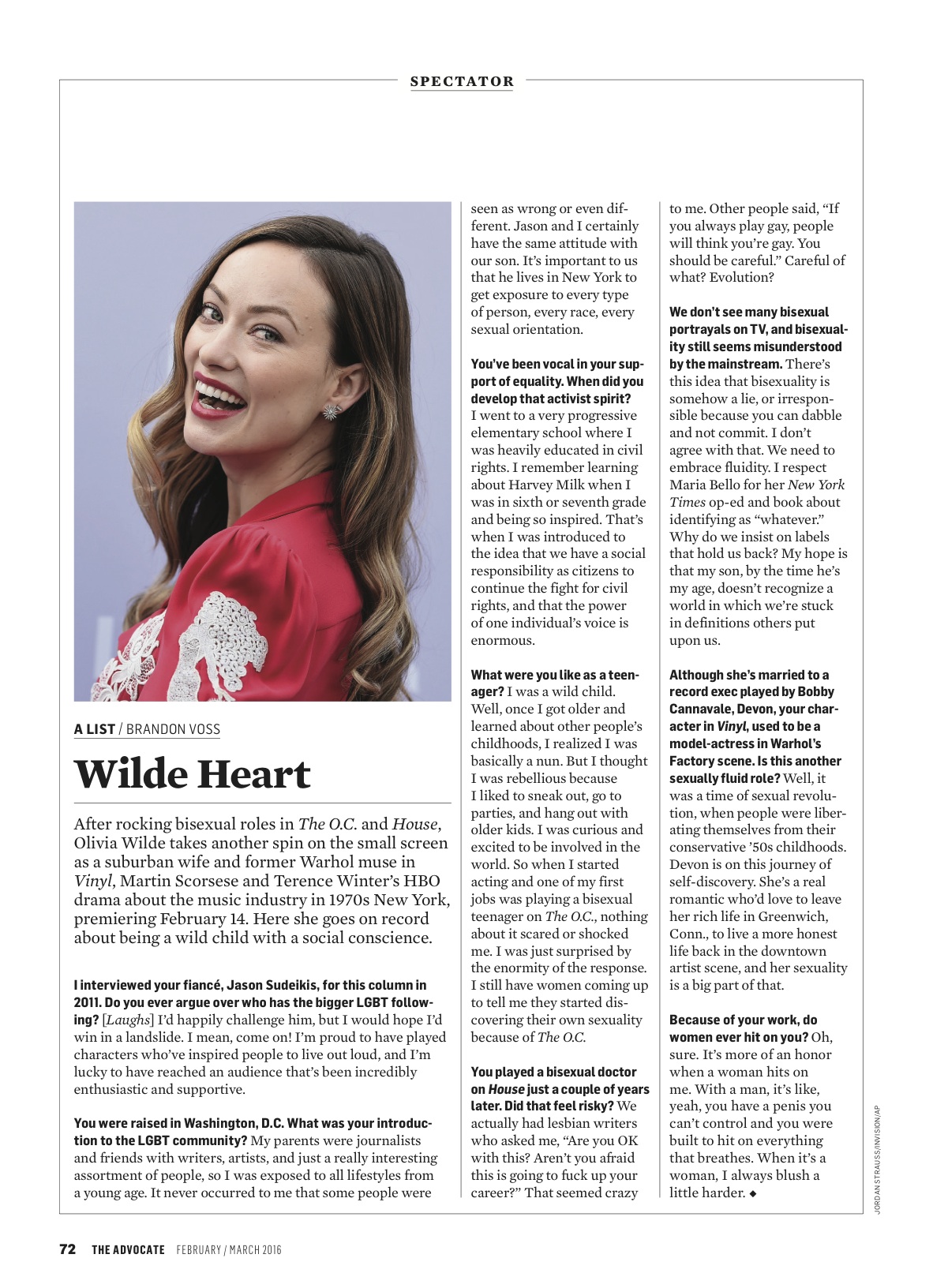After rocking bisexual roles in The O.C. and House, Olivia Wilde takes another spin on the small screen as a suburban wife and former Warhol muse in Vinyl, HBO’s drama about the music industry in 1970s New York, premiering February 14. Here she goes on record about being a wild child with a social conscience.
By Brandon Voss
The Advocate: I interviewed your fiancé, Jason Sudeikis, for this column in 2011. Do you ever argue over who has the bigger LGBT following?
Olivia Wilde: [Laughs] I’d happily challenge him, but I would hope I’d win in a landslide. I mean, come on! I’m proud to have played characters who’ve inspired people to live out loud, and I’m lucky to have reached an audience that’s been incredibly enthusiastic and supportive.
You were raised in Washington, D.C. What was your introduction to the LGBT community?
My parents were journalists and friends with writers, artists, and just a really interesting assortment of people, so I was exposed to all lifestyles from a young age. It never occurred to me that some people were seen as wrong or even different. Jason and I certainly have the same attitude with our son. It’s important to us that he lives in New York to get exposure to every type of person, every race, every sexual orientation.
You’ve been vocal in your support of equality. When did you develop that activist spirit?
I went to a very progressive elementary school where I was heavily educated in civil rights. I remember learning about Harvey Milk when I was in sixth or seventh grade and being so inspired. That’s when I was introduced to the idea that we have a social responsibility as citizens to continue the fight for civil rights, and that the power of one individual’s voice is enormous.
What were you like as a teenager?
I was a wild child. Well, once I got older and learned about other people’s childhoods, I realized I was basically a nun. But I thought I was rebellious because I liked to sneak out, go to parties, and hang out with older kids. I was curious and excited to be involved in the world. So when I started acting and one of my first jobs was playing a bisexual teenager on The O.C., nothing about it scared or shocked me. I was just surprised by the enormity of the response. I still have women coming up to tell me they started discovering their own sexuality because of The O.C.
You played a bisexual doctor on House just a couple of years later. Did that feel risky?
We actually had lesbian writers who asked me, “Are you OK with this? Aren’t you afraid this is going to fuck up your career?” That seemed crazy to me. Other people said, “If you always play gay, people will think you’re gay. You should be careful.” Careful of what? Evolution?
We don’t see many bisexual portrayals on TV, and bisexuality still seems misunderstood by the mainstream.
There’s this idea that bisexuality is somehow a lie, or irresponsible because you can dabble and not commit. I don’t agree with that. We need to embrace fluidity. I respect Maria Bello for her New York Times op-ed book about identifying as “whatever.” Why do we insist on labels that hold us back? My hope is that my son, by the time he’s my age, doesn’t recognize a world in which we’re stuck in definitions others put upon us.
Although she’s married to a record exec played by Bobby Cannavale, Devon, your character in Vinyl, used to be a model-actress in Warhol’s Factory scene. Is this another sexually fluid role?
Well, it was a time of sexual revolution, when people were liberating themselves from their conservative ’50s childhoods. Devon is on this journey of self-discovery. She’s a real romantic who’d love to leave her rich life in Greenwich, Conn., to live a more honest life back in the downtown artist scene, and her sexuality is a big part of that.
Because of your work, do women ever hit on you?
Oh, sure. It’s more of an honor when a woman hits on me. With a man, it’s like, yeah, you have a penis you can’t control and you were built to hit on everything that breathes. When it’s a woman, I always blush a little harder.
The Advocate, February/March 2016 issue.


